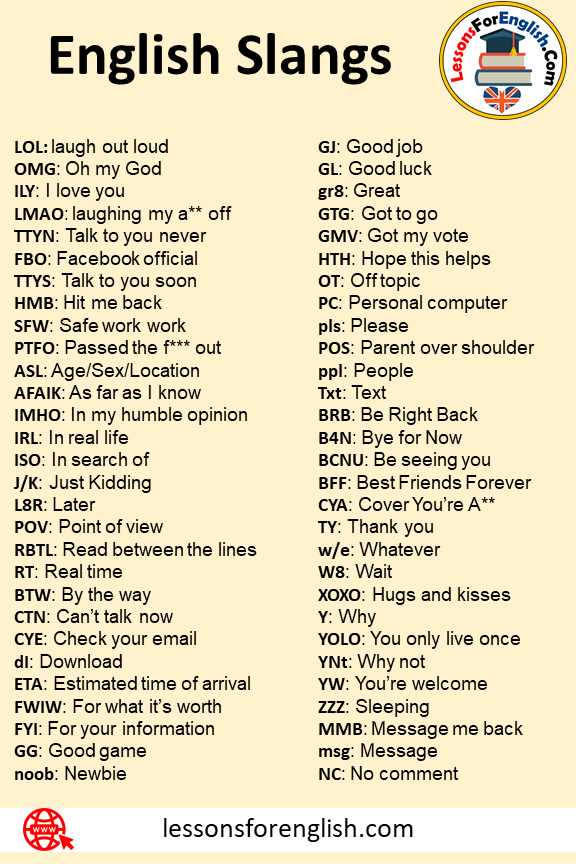100 English Slangs, Meanings and Example Sentences with Slangs

English Slangs
English Slangs have evolved over the centuries, changing from one social segment to another. As in other languages, slang words play an effective role in simplifying and accelerating the dialogues of speakers in English. However, it also represents belonging to a certain social circle of society that uses slang expressions. So slangs strips people out of the crowd and breathes new life into the language.
Failure law: Just like Murphy’s law, it says that something likely to go wrong will go wrong.
In many countries, adding new slang phrases to the language is linked to the younger generation using slang text message abbreviations in social media networks, online conversations, and YouTube channels.
However, English Slang is widely used by various generations and communities from different parts of the country and has an impressive history that has been studied and recorded in detail. In 1889, the English Slang Dictionary had seven volumes. Today, we have hundreds of articles written on slang terms, with new ones added each year.
Waffle: If someone is talking, but not saying something of value, “waffle” means talking or “waffling.”
For someone who has learned English as a foreign language, English Slang will sound a little mixed, as it involves a mixture of different dialects found in each part of the country. But you don’t need to learn all the strange words you encounter. First, you just need to learn the most popular phrases used by the majority of the public in the UK.
Now let’s look at examples related to English Slangs that are common:
Leg it: Used to rush for something, run.
Both “Mate” and “Lad” mean “friend” and are synonymous with “dude”, “pal” and “buddy” in American English. If you’ve seen British films, you’ve noticed how often the British use the words “mate” and “lad” in their conversations.
Although you have never seen a British film before, we recommend starting with short films. Because such productions include almost every expression that exists in English slang.
Ace: This word, which means” bright, very good”, is more common in Liverpool. You can use this word, which can be used as both a noun and a verb in a sentence, as in the following example:
- “Tomas’ ace at writing article”
Blocked: Means” male“, similar to the words” guy “or” dude”. The word is the most common slang phrase in the UK for the type of man who goes to bars and has very ordinary habits.
Chinwag: An expression that means to chat, is mostly used in the form of a verb. The phrase, which originated in Wales, was originally translated as” the cup is empty”. But when a bar owner used this word when filling customers ‘ cups to drink too much, it later gained the current meaning of “chatting. ”
Gutted: Means completely disappointed and upset. The slang first appeared in 1984 and has since been widely used in other parts of the UK, along with Scotland.
Dishy: Used to describe someone very attractive and sexy.
Chuffed: Means satisfied with the achievements or any situation.
Gobsmacked: The word meaning very surprised describes the shape your mouth makes when you stay in counterpoint.
Jammy: Meaning very lucky, this phrase comes from the word “jam”, which is used in colloquial language for things that are easy to achieve.
Jimjams: Another name for slumber.
Popular Slang Words Among Students
If you are an English student who is going to the UK to study, you will need some of these idioms to fit in with your classmates. For example:
- Well gel: Means to be too jealous of something. The word, which came from Essex and settled into slang, has settled into people’s memory thanks to famous television shows.
- Nosh: Means a short lunch with snacks or a light meal eaten at any time of the day.
- Knackered: Means very tired, finished. In many magazines, you can find another word describing this fatigue and lethargy.
Here are Other English Slang Words and Meanings;
GJ: Good job
GL: Good luck
gr8: Great
GTG: Got to go
GMV: Got my vote
HTH: Hope this helps
OT: Off topic
PC: Personal computer
pls: Please
POS: Parent over shoulder
ppl: People
Txt: Text
BRB: Be Right Back
B4N: Bye for Now
BCNU: Be seeing you
BFF: Best Friends Forever
CYA: Cover You’re A**
TY: Thank you
w/e: Whatever
W8: Wait
XOXO: Hugs and kisses
Y: Why
YOLO: You only live once
YNt: Why not
YW: You’re welcome
ZZZ: Sleeping
MMB: Message me back
msg: Message
NC: No comment
LOL: laugh out loud
OMG: Oh my God
ILY: I love you
LMAO: laughing my a** off
TTYN: Talk to you never
FBO: Facebook official
TTYS: Talk to you soon
HMB: Hit me back
SFW: Safe work work
PTFO: Passed the f*** out
ASL: Age/Sex/Location
AFAIK: As far as I know
IMHO: In my humble opinion
IRL: In real life
ISO: In search of
J/K: Just Kidding
L8R: Later
POV: Point of view
RBTL: Read between the lines
RT: Real time
BTW: By the way
CTN: Can’t talk now
CYE: Check your email
dI: Download
ETA: Estimated time of arrival
FWIW: For what it’s worth
FYI: For your information
GG: Good game
noob: Newbie
